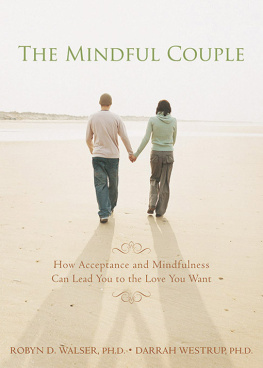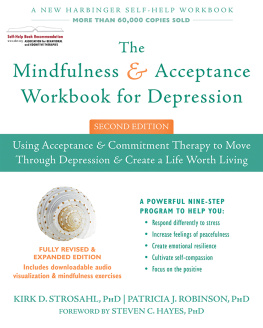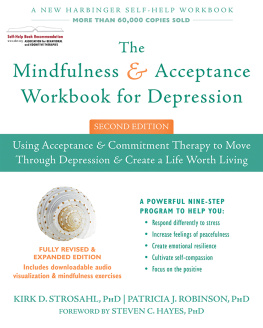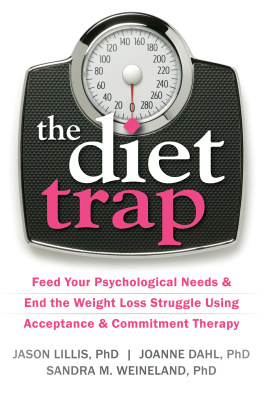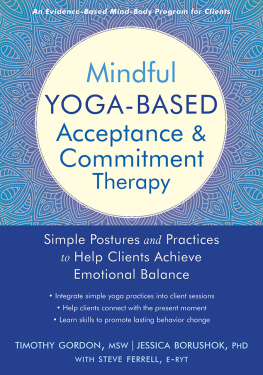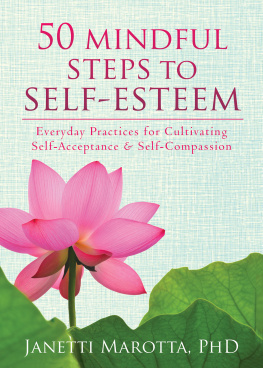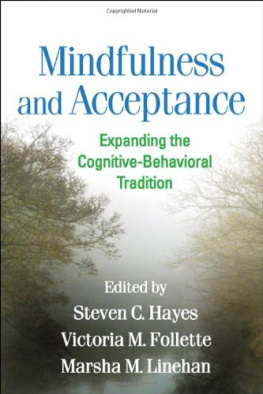Acknowledgments
Heartfelt thanks to all the couples (many of whose names have been changed) who shared their stories with us and were willing to have us write about their wonderful and sometimes painful experiences. Special thanks go to our generous husbands, who were willing to let us put our own relationship experiences on paper to share with the world. We wish all of you the best on your path to creating your mindful and vital relationship.
Robyn D. Walser, Ph.D., is a psychologist who works as a consultant, workshop presenter, and therapist in her private business, TL Consultation Services. She also works at the National Center for PTSD in the Veterans Affairs Palo Alto Health Care System in California. She received her doctorate in clinical psychology from the University of Nevada, Reno, and has clinical and research expertise in traumatic stress, substance abuse, and acceptance and commitment therapy (ACT). She is an internationally recognized trainer in ACT and has co-authored journal articles, book chapters, and two books on this intervention.
Darrah Westrup, Ph.D., is a clinical psychologist with the National Center for PTSD at the Veterans Affairs Palo Alto Health Care System in California. She serves as attending psychologist at the Womens Trauma Recovery Program, a ten-bed, sixty-day residential treatment program for women veterans with military-related PTSD. She is also program director of the Outpatient Womens Mental Health Center. Westrup received her graduate degree from West Virginia University and completed her postdoctoral fellowship in the behavioral medicine department at Stanford University. She has clinical and research expertise in the areas of PTSD, substance abuse, stalking behavior, and experiential avoidance as it relates to psychological dysfunction.
Part 1
The Acceptance and Commitment Approach

1 Living a Mindful and Vital Relationship
Love does not consist of gazing at each other, but in looking together in the same direction.
Antoine de Saint-Exupry
One of the fundamental, universally desired human experiences is connection. Whether we look at this from a spiritual perspective or an evolutionary perspective, the outcome is the same: we want to belong and have partnership. Most often, the foundation of such a union is love. Partnership is built upon the strength of loving bonds and the kindnesses that accompany those bonds. So, when we talk about partnership, were talking about loving and being loved. Easy enough, right? Why not just be loving? Why not just be loved? Its true that this is easier for some of us than for others. Some come from loving families and know well what it means to belong and feel loved. Others, however, dont have that good fortune, with the result that loving and being loved are harder and may even feel impossible. Even those who come from a loving background can struggle with love. Considering all our individual personalities, histories, families, and dynamics, frankly, its a miracle people can meet, fall in love, and commit to lasting bonds. Despite what might be predicted, it happens all the time. But we must acknowledge one big qualifier: relationships fall apart and end all the time too.
The divorce rate in America, though declining in recent years, remains high, with more than a third of first marriages ending in divorce before the couple reaches their fifteenth anniversary (Wolfers 2008). You may have to go through numerous relationships before committing to a marriage. If you are married, do you remember how many prior relationships you had? If you are not married, what number relationship are you in now? So heres the baffling part: if most of us want to belong and be loved, why do we struggle so much and leave partnerships so often?
This conundrum may have many explanations. It may be that the person you are with right now just isnt the right one. It may be that you are single and still looking. It may be that circumstances and timing are getting in the way. All of these can well be part of the problem. We want to add two other possibilities: experiential avoidance and unlived values. That is, we think couples get into trouble when they are afraid to feel their emotions and to express certain thoughts, or when they do things that are inconsistent with what truly matters to them. Either of these issues can cause struggle in a relationship, and the two together can be lethal. Together, they can be like a poison that quickly spreads through the bloodstream of the relationship and stops it dead in its tracks, or they can be like a slowly spreading poison that painfully squeezes the breath out of the relationship after many years.
The antidote? Were glad you asked. The cure for these two ailments (experiential avoidance and unlived values) can be found in a new behavioral therapy called acceptance and commitment therapy (Hayes, Strosahl, and Wilson 1999). The description of this therapy lies in its name. Its about learning to accept avoided experiences and to take regular action based on personal values. Lets take a closer look at each of these processes.
Accepting avoided experiences means remaining fully open and willing to feel, think, and sense whatever you are feeling, thinking, and sensing. Taking regular action with respect to your personal values involves choosing to create a life consistent with what matters to you. These two processes are very dynamic and require regular effort. But the potential payoff is huge. If you can move through a relationship while practicing acceptance and committing to your values, then you can bring unequaled vitality to it. What were suggesting is that you engage in a process of holding (rather than avoiding) your internal experiences, while also taking steps to move yourself in a particular direction inside of your relationship.
The recipe for the bond created here doesnt call for cups of miracles or pints of just figure it out; rather, it just calls for dashes of mindfulness and a few pinches of vitality. Of course, youll be cooking for the rest of your life! So lets look more closely at some of the ingredients (both those you want to include and those you dont).
The Problem of Experiential Avoidance
Experiential avoidance happens when we dont like how we feel or are bothered by what we think, and then we take actions to eliminate these feelings or thoughts. It might look like this. Imagine that you are doing something, and then you suddenly feel anxious. How do you handle it? If youre like most people, you try to figure out how to get rid of the feeling. You dont like anxiety. And why should you? Its unpleasant. Your heart races, you sweat, and you breathe faster. You may turn red, feel dizzy, or be unable to think. Your mind may say, Whats wrong with me? Im so stupid. Why am I feeling this way? How embarrassing!
So, it seems the best thing to do is to stop this awful feeling and the thoughts that come with it (both are internal experiences). To do this, you might leave the situation causing the anxiety or avoid the situation altogether (avoidance). Ah, success! You feel free of the anxiety and problematic thoughts. This solution makes sense, particularly if what you really want in your life is good feelings, such as happiness, joy, and love. So, you conclude, Out with the bad experiences and in with the good.
If you think broadly, you can see this applies not only to anxiety but to all emotions and thoughts you dislike. You have a whole range of emotions to be avoided: sadness, pain, loneliness, fear, as well as thoughts about being worthless or unlovable and thoughts about failure and contempt. Each of these seems to be begging you to make it go away.

